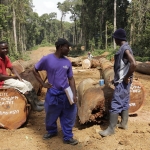More on the Mexican GM Maize Scandal: Conquering Nature
...And Sidestepping the Debate Over Biotech and Biodiversity
Nature magazine's flip-flop today over the testing protocols involved in determining GM maize contamination in Mexico - the Centre of Genetic Diversity for the vital food crop -- is just the latest in a string of absurdities as the scientific community struggles over what to do as genetically-modified germplasm invades the genetic homelands of the world's food supply.
De-naturing Nature
UK-based Nature magazine -- arguably one of the world's most influential peer-reviewed science publications -- in an editorial note today, states that contrary to its report of November 29th, 2001, "the evidence available is not sufficient to justify the publication of the original paper." In other words, farmers' fields in Oaxaca and Puebla have not been proven to be contaminated with GM maize. The current issue of Nature contains two articles by scientists refuting the original contamination claims and a reply from the two scientists who authored the original peer-reviewed report. David Quist and Ignacio Chapela of the University of California at Berkeley stand by their study and add that other studies by the Mexican Government confirm their findings.
Blind-Siding Biodiversity
Nature's double take couldn't have come at a bettertime for the biotech industry. Next Monday, more than 150 governments and equal numbers of civil society organizations will gather in The Hague, Netherlands for the tenth anniversary meeting of the UN Convention on Biological Diversity
(CBD -- April 8 - 26). A moratorium on Terminator technology, the protection of forests, and discussions around a just-completed treaty on plant genetic resources are all on the agenda.
The case of GM contamination in Mexico was bound to be on the minds of many delegations. The final week of meetings is set aside to review progress on the Cartagena Biosafety Protocol adopted two years ago. The elements of that protocol and its crucial Precautionary Principle would bring the Mexican scandal to the fore as well. "If the CBD can't act on the Mexican situation, if governments cannot agree that the Precautionary Principle applies in this case," says Silvia Ribeiro of ETC, "then there is little hope that this ten-year old Convention serves any useful purpose." Nature's editorial could have the effect of de-fusing and confusing governmental concern.
Withholding Evidence?
The scientific battle raging since at least last September has been over the efficacy of the testing processes. There has been almost no substantive discussion of the likelihood or the implications of GM contamination. In fact, most maize scientists agree that contamination is highly likely and inevitable given the breeding habits of the crop.
Meanwhile, Mexican farmers and other civil society organizations are impatiently awaiting two overdue new reports on the situation commissioned by the Mexican Government. It now appears that political pressure is being applied within the Government to delay publication until after the international conference in The Hague. Although the Secretary of Environment of Mexico, through its Institute of Ecology (INE) contracted two institutions to undertake new tests, the results have been excessively delayed. According to CSOs in Mexico City, the testing done to date all confirms the original Berkeley study.
Precautionary Practices
Civil Society Organizations gathered at the World Social Forum in Brazil wrote on February 6th to both the Consultative Group on International Agricultural Research (CGIAR) and to the UN Food and Agriculture Organization (FAO) asking them to take action with respect to Mexican maize contamination. The CGIAR's flagship institute, the International Maize and Wheat Improvement Centre (CIMMYT) is just outside Mexico City and is deeply embroiled in the transgenic contamination debate. In a reply dated February 13th, CGIAR expressed concern but declined to take any specific steps. The global network of public research institutes is partly funded by the U.S. Government and is negotiating a number of technology licensing agreements with the biotech industry. "One official told us that the issue was just too hot politically for the CGIAR to get involved," Pat Mooney of ETC group notes.
FAO has been more forthcoming. In a letter dated March 22nd, FAO acknowledged that the situation was serious and reported that the UN agency -- in contrast to CGIAR -- has requested CIMMYT to investigate the implications for genetic diversity in Mexico and any possible consequences for CIMMYT's maize gene bank. The world's most important international maize collection is held in trust by CIMMYT under the auspices of FAO. FAO expects CIMMYT to report on the situation when its intergovernmental commission meets in Rome this October. Further, FAO is developing a Code of Conduct on Biotechnology and the issues of agenda.
Biodiversity's Bottom Line
"The whole debate in Nature is an obfuscation of the real issue," Hope Shand of ETC group says, "Maize breeders and geneticists all know that GM introgression with traditional farmers' maize varieties in Mexico is inevitable and most are convinced that it has already taken place. Whatever the status of the various studies, the reality is that a Centre of Crop Genetic Diversity has been contaminated and no one is doing anything about it. We realize that some scientists do not consider the contamination to be a problem. We disagree.
Regardless, we all agree -- even CIMMYT -- that rigorous study of the implications is needed. In the meantime however, there must be a complete moratorium. The GIAR should stop stalling and get with the programme!"
For further information:
Pat Roy Mooney: etc@etcgroup.org (204) 453-5259 CST -- Winnipeg
Hope Shand: hope@etcgroup.org (919) 960-5223 EST -- North Carolina
Silvia Ribeiro: silvia@etcgroup.org (52) 5555-63-26-64 CST -- Mexico City
The Action Group on Erosion, Technology and Concentration, formerly RAFI, is an international civil society organization headquartered in Canada. The ETC group is dedicated to the advancement of cultural and ecological diversity and
human rights. www.etcgroup.org
- 181 Food and Agriculture



